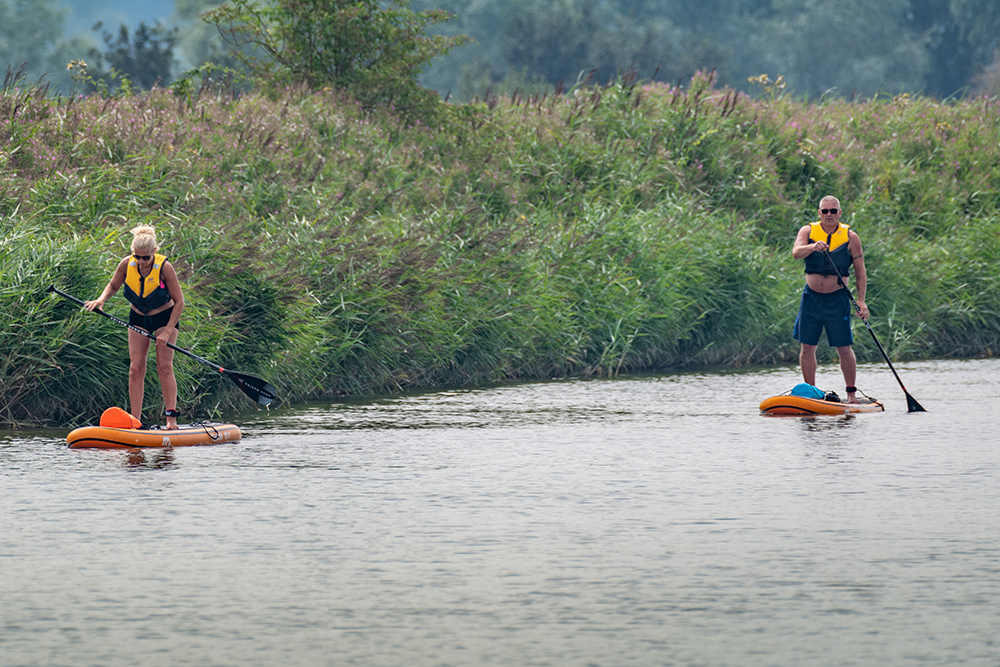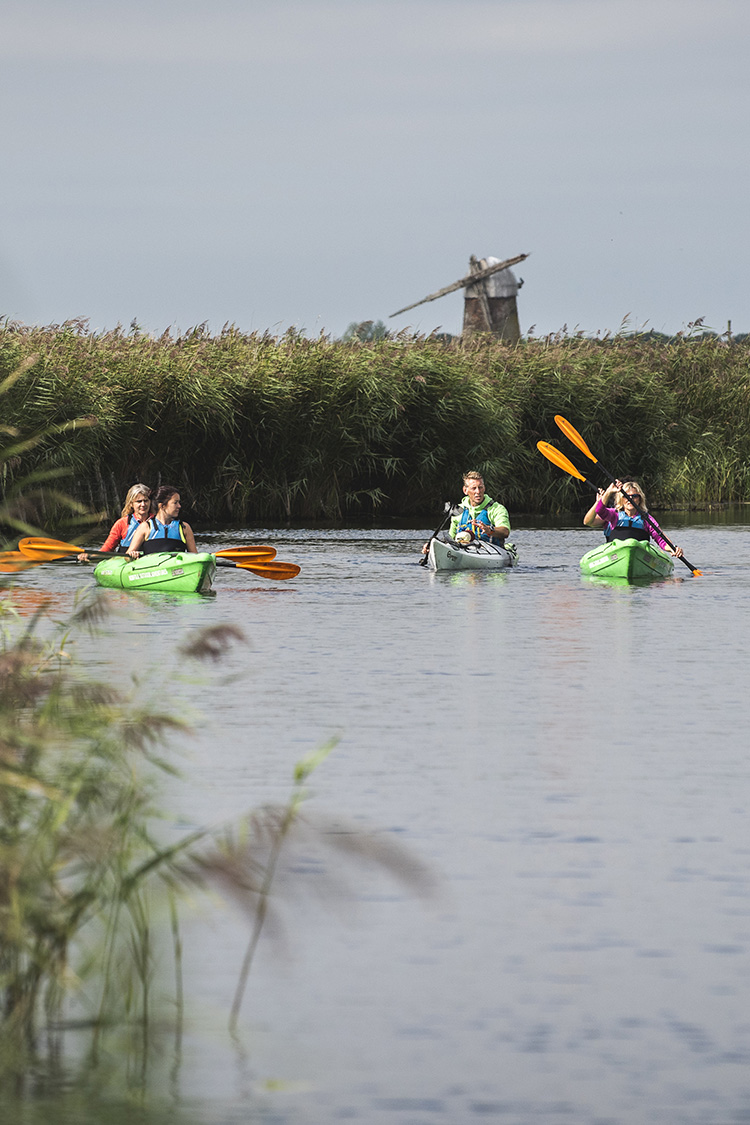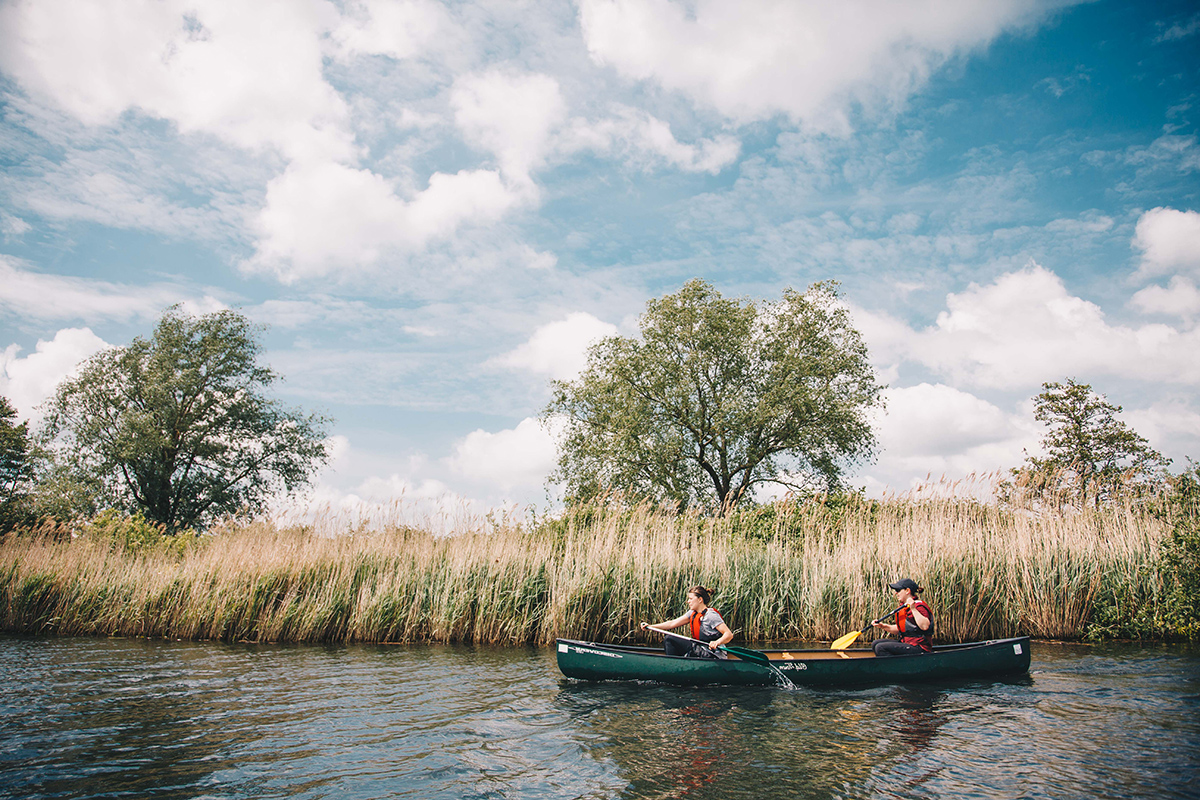Canoeing, kayaking and paddleboarding
Canoeing, kayaking and stand-up paddleboarding are increasingly popular sports that are enjoyed by many visitors to the Broads.

Not only do paddle craft offer access to some of the quieter backwaters of the Broads, they are also a great way to keep fit and explore the landscape in an environmentally-friendly manner.
If you are new to paddling on the Broads please find relevant information on this page which you should read before getting onto the water, such as how to toll your craft and rules on being a safe paddler.
We also suggest that you visit the Paddlers Code website, launched in conjunction with PaddleUK, to find out how to get the most out of your craft.
Registering your craft and paying tolls
All canoes, kayaks and stand-up paddleboards (including inflatables) that are used in the Broads navigation area or adjacent waters are required to have either an annual or short visit toll. Paddle UK members are exempt from paying tolls making an annual membership a great option for frequent paddlers - please see the section below for more information.
All vessels that are used for more than 28 days in the financial year must be registered with the Authority and are liable to pay an annual toll and display vessel registration marks. Vessels that will be used for less than 28 days do not need to be registered and can be tolled using a short visit toll (available for either 7 or 14 day periods).
To view the current annual and short visit toll charges, please visit the tolls page on our website.
Toll money goes towards the maintenance, upkeep and improvement of the waterways. Examples of where toll money is spent includes cutting water plants, installing new access points and employing Broads Authority Rangers who patrol the waterways to keep visitors safe.
For details on how to register your craft or pay your toll (which can be done online, over the phone or in person) please see our tolls web page. Alternatively short visit tolls can be purchased from a number of outlets in the Broads.
If you need any help or advice tolling your craft please phone our friendly tolls team on 01603 756080 or email tolls@broads-authority.gov.uk.
Paddle UK members
Amongst other benefits, if you are a member of Paddle UK you are licensed to canoe, kayak or stand-up paddleboard on any of the Broads Authority waterways including the main rivers and associated broads and dykes without the need to pay a toll on your craft. Membership is currently £60 a year per person, with discounted rates for couples, families, and existing members. You can find more information on the Paddle UK membership page.
You will need to carry proof of your PaddleUK membership with you when you paddle in the Broads, such as your digital or physical membership card. Broads Authority Rangers may ask to see this when you are on the water.
Paddling videos
Rules for safe paddling on the Broads

Although canoeing, kayaking and paddleboarding are very accessible sports, it is important you take some time to understand the rules of the river and how to be safe on the water.
A great resource to help you paddle safely and responsibly is the Paddler's Code website. We suggest that all new paddlers read and familiarise themselves with the information provided. Some of our other favourite tips which are specific to the Broads can be found below:
Wear a buoyancy aid if you are canoeing, kayaking or paddleboarding
No matter how experienced you think you are in the water, falling in can present many dangers to those who are taking part in paddlesports and a buoyancy aid will always help to keep you safer! If you are stand-up paddleboarding, you should also wear a tether or leash too.
Stick to the right hand side of the river at all times unless it is unsafe to do so
River traffic is always required to stay to the right hand side of the channel (unless it is unsafe to do so) and paddle craft are no exceptions to this. If you are being overtaken on the left, please ensure you stay right until the vessel has passed. Please do not congregate in the middle of the channel, particularly if you are in a group.
Sailing craft may tack (zig-zag) across the river, please be aware of their movements and give them adequate space to manoeuvre safely.
Ensure you maintain lookout and are aware of your surroundings
Keep an eye out for other river users, such as larger powered and sailing craft, and make sure that you are aware of any potential hazards approaching from either direction. Other river users need to observe those taking part in paddlesports, maintain good lookout, ensure they watch their wash whilst overtaking and provide adequate room to pass them safely.
Anticipate other river users
Think ahead to whether boats are going to be mooring up, turning round or tacking across the river (if they are sailing craft). If they are, try and give them space to do this safely. It is wise to anticipate how other river users are going to behave as paddle craft are often less manoeuvrable than larger vessels.
Capsizing or entering the water
Do not deliberately capsize your canoe or kayak. If you have capsized and are not able to get back into your vessel you should try to remain calm, stay with your vessel, move over to shore and take a moment to recover. Techniques for recovering from capsize or entering the water can be found online or learned at paddle school.
Be aware of your own stamina and ability
Paddle sports can be tiring and those taking part should be aware of their own ability. If you fall in the water, consider whether you will have enough energy to get yourself back onto your craft safely. If you are inexperienced and feel as if you will fall into the water frequently, consider avoiding busy stretches of the river.
Water-borne diseases
There are a number of risks from water-borne diseases if you enter the Broads' waterways.
A blue-green coloured scum on the water can indicate the presence of toxic bacteria in the water. Do not paddle in areas where this is present and avoid coming into contact with or ingesting it as it can lead to a number of unpleasant symptoms.
Weil's disease (also known as Leptospirosis) is a rare form of a bacterial infection that is carried by animals such as rats and cattle. It can be caught by humans through contact with animal urine through contaminated fresh water. You can reduce the chance of contracting the infection by covering open wounds, minimising the swallowing of water, showering soon after swimming or if you have fallen in, and washing your hands before eating or drinking.
Furthermore, you can see where storm overflows discharge untreated sewage into rivers on the Rivers Trust's Sewage Map. Our advice is to avoid entering the water in these locations if we have recently experienced heavy rain. When heavy rain occurs, sewers can discharge directly into rivers, increasing the possibility of infection or disease if you enter the water in these areas.
If you have recently taken part in paddle sports and do not feel well please seek urgent medical advice.
Check permissions, know where you are going and tell others of your plan
It is helpful to plan your route so that you know how far you are going and to avoid trespassing on privately-owned stretches of water. Whilst most of the Broads is publicly accessible, some areas (such as dykes and ditches) are privately-owned and do not have a public right of way. There will usually be signage advising you of this. It is also sensible for paddle craft to avoid busy stretches of the river and seek out quieter areas as it will be safer (and considerably more peaceful).
It always makes things safer if you go out as a group with others. However if you do go solo, remember to tell friends or family where you are going and how long you plan to be out in case you get into difficulty. Knowing the names of locations or what3words references will help the emergency services locate you in the event of emergency.
Look at the weather conditions
Weather conditions can change quickly in the Broads and many areas are very exposed to the elements. Consider factors such as wind speed, wind direction, forecasted rain and storm conditions before you go out. You may find that you are struggling to paddle back or turn around if the wind direction is not favourable.
In case of emergency
In case of emergency on, in or next to the water you should always contact 999 and ask for the coastguard. They will contact the other emergency services if needed. Try and ensure you know your location so you can provide this information to the operator and improve their response time.
Where can I launch and where can I paddle?
The Broads is dotted with slipways and launching points from which you can get your craft in and out of the water. Many of these launch points will be free to use, but some may charge a launching fee so please check ahead of time. There may also be limited parking at certain locations and paddlers should check ahead of time to ensure they can be accommodated.

Paddle craft can be launched from some of our 24-hour moorings, however please give way to boats wishing to moor and only launch where it is safe to do so (avoiding highly tidal areas and large drops from the bank to the water). Follow any local signage present.
Paddle craft can allow you to discover the many nooks and crannies of the Broads, however be aware that you must respect nature reserves, avoid private land and paddle away from the edges where appropriate to minimise disturbance to breeding birds. We also do not recommend paddling in the lower reaches as these more tidal waters will require you to be extremely experienced, fit and able.
To help you navigate your way around, we have produced a number of paddle trail maps that can be accessed on Visit the Broads.
Trinity Broads
Although they may look appealing to paddlers, the Trinity Broads (Ormesby, Rollesby, Filby, Ormesby Little and Lily Broads) are privately owned bodies of water and are not connected to the Broads navigation.
They are managed by the Norfolk Wildlife Trust on behalf of Essex & Suffolk Water and are a drinking water supply, a Site of Special Scientific Interest and part of the Broads Special Area of Conservation (SAC). No paddle craft are allowed to use the Trinity Broads, and the Norfolk Wildlife Trust have strict controls in place to reduce the chance of invasive species contaminating the ecosystem.
If you have any enquiries about access please contact Eilish Rothney, Nature Reserve Warden by emailing eilishrothney@norfolkwildlifetrust.org.uk.
Other information and resources
There are many great local schools and online resources that provide tuition on canoeing, kayaking or paddleboarding, and a number of providers that offer guided excursions for those who are less confident paddlers.
- The Paddlers Code
- Paddle hire, trips and schools in the Broads
- Paddle UK
- Broads Authority canoeing waterways code leaflet
- Canoeing and kayaking safety advice from the RNLI
- Information and advice from Go Paddling
Organising events
If you are planning an organised paddling event please see our events guidance web page for more information on how to proceed.

